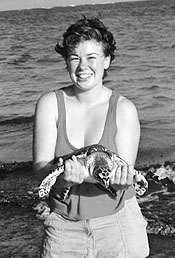I’m Tormented by Turtles

by Casey Rose Fagre ’03
This is the winning entry in the Chronicle Student Essay Contest, held this fall. Casey Rose Fagre, from West Glacier, Montana, is a senior majoring in environmental studies. She is the recipient of a Morris K. Udall Foundation
Scholarship and a member of the Dr. Robert B. Pamplin Jr. Society of Fellows. Her essay was prompted by an overseas study trip to Kenya and Tanzania in fall 2001.
One of the more wonderfully bizarre experiences of my life occurred in the small touristy village of Watamu, Kenya, where I was studying the sea turtle conservation efforts of a local nonprofit organization called Watamu Turtle Watch (WTW).
While volunteering for WTW, I had the honor of returning a Hawksbill sea turtle to the ocean after she had been captured in a fisherman’s net. During the transport from the capture site to the release site, I held this incredible creature on my lap, admiring the ornate details of her shell as she struggled to free herself from my firm grip.
The other volunteers, with months of turtle releases to their credit, were amused by my enthusiastic commentary: “I can’t believe I am holding a critically endangered species while we’re driving down the dusty dirt roads of an East African village! Is this really happening? This is amazing!” Yet even more exciting was the very moment when I released the turtle into the sea, where she was once again free to swim among the coral reefs.
In painfully sharp contrast, the next day I came face-to-face with compelling evidence of the crucial need for sea turtle conservation efforts. Nothing could have prepared me for the sobering encounter with a headless, tailless, flipperless Green sea turtle that had washed up on the beach that morning. Most likely the turtle’s appendages were hacked off to facilitate easier detanglement from a net on a shrimp trawling vessel that was illegally operating without a turtle excluder device. I was devastated.
The disparity between my euphoria one day and depression the next intensified my motivation to halt the daily injustices committed against the natural world. I thought that I had discovered my true purpose in life. I promised myself that I would become “the world’s leading sea turtle conservationist” and felt relieved that my future path was finally assuming a specific direction.
But now, sitting in Watzek Library almost a year later, my ambitions are not so clearly defined. Since embarking on my last year of college, I am increasingly asked The Senior Question: “So what are you going to do with the rest of your life?” I have a supply of standard responses, my favorites being “That’s a good question!” and “I don’t know … I like to take opportunities as they come.” But I don’t tell anyone about my sincere desire to become “the world’s leading sea turtle conservationist.” Why is this?
I think it’s because the impulse I experienced in Watamu is seemingly locked in conflict with my consciousness. The breadth of environmental issues I have studied at Lewis & Clark, as well as my time spent abroad, have raised my awareness of the multitude of crises and problems in our world. The evidence suggests that many of these issues should take priority over saving a particular species of “charismatic megafauna.” Believing this, how do I justify dedicating myself to protecting sea turtles rather than addressing global climate change, overpopulation, or sustainable development?
Because many causes of sea turtle endangerment are linked to broader environmental issues, I am hopeful that I may find a way to save turtles through working on problems such as coral reef destruction, poverty, and deforestation. However, focusing on a systemic approach would leave me with little direct contact with sea turtles. On the flip side, interactive sea turtle conservation that involves turtle releases, nest protection, and population monitoring would not significantly affect critical large-scale environmental problems.
My struggle between heart and mind is likely one that everyone experiences at some point in life, and one that applies in many contexts. It poses a fascinating question that I will continue to explore: When should I follow my emotional desires and when is it better to shape my life around rational deductions?
The Chronicle staff extends a special thanks to our contest judges: Micha Grudin, associate professor of English; Susan Hubbuch, director of the Writing Center; Susan Kirschner, senior lecturer in humanities; and Judy McNally, associate vice president for public affairs and communications.
More L&C Magazine Stories
Lewis & Clark Magazine is located in McAfee on the Undergraduate Campus.
MSC: 19
email magazine@lclark.edu
voice 503-768-7970
fax 503-768-7969
The L&C Magazine staff welcomes letters and emails from readers about topics covered in the magazine. Correspondence must include your name and location and may be edited.
Lewis & Clark Magazine
Lewis & Clark
615 S. Palatine Hill Road MSC 19
Portland OR 97219

